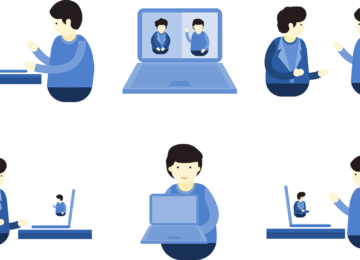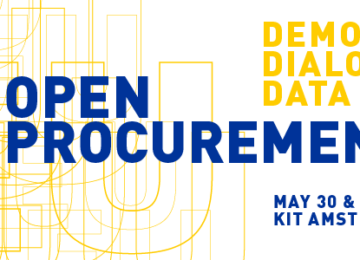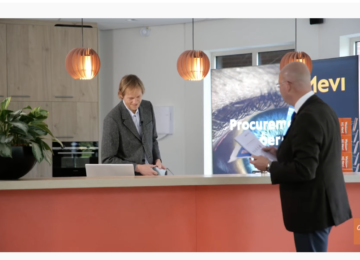Each year, the central government spends €16.0 billion of public money on the purchase of goods, services and products through public tenders. Examples of these purchases are work clothing such as uniforms, ICT products such as laptops and flexible labour. Despite the large volume of public procurement, the Dutch government does not make procurement data centrally accessible and public, and the Netherlands does not have a national contract register.
Current issues
On data.overheid.nl all expenditure for that year (2015-2019) is listed per ministry and per company, but without the actual prices. Data and information on planned tenders and awarded contracts are fragmented across various platforms and systems such as TenderNed and Negometrix. Furthermore, the data within these platforms is often incomplete. For example, contracts are archived, and the prices that are published in TED data is only included in 40-45% of cases. Additionally, the information about the award and quality criteria and the award decision is often missing. In addition, timely/real-time publication of tender documents and data is missing, and the published data is subsequently difficult to find and search.
The value of open contracting
Making tenders and contracts public and transparent provides added value. It holds the government accountable for the actions undertaken and allocations of public funds spent through tenders. It also contributes to several social and economic objectives:
- More effective cooperation between (local) governments: through improved public service delivery and better insight into the demand for, and supply of, procurement, including at the local level.
- Better value for money: in this way, the use of innovative technologies is promoted and efficiency is increased. Insight into players and the competitive field further improves the quality of the purchases and services awarded.
- Fairer competition and a level playing field for businesses: as mentioned above, public tenders and contract on competitive bidding give smaller businesses the opportunity to compete. Small and medium-sized enterprises, which now have difficulty accessing the market, are given a better insight into possible contracts.
- Prevention of fraud and corruption: If tenders are available to companies that want to tender and to researchers, governments, NGOs, journalists, supervisory bodies and (specialised) prosecutors, they can trace contracts for possible forms of corruption.
- Smarter analysis and better solutions to public problems: public procurement and contracts encourage green, socially responsible and innovative procurement. It also increases transparency and accountability through better data management.
Open Contract Register
In cooperation with the Ministry of the Interior and Kingdom Relations, the Open State Foundation is developing an Open Contract Register which will contain all public data on procurements by the State. This is a result of the Netherlands’ involvement in the Open Government Partnership National Action Plan. One of the commitments within this action plan is to carry out a pilot project revolving around the Open Contracting Data Standard (OCDS) with the aim of improving data and information provision. The Home Office has investigated how current contract data relates to OCDS and wants to increase dialogue between government and potential re-users of the data. In addition, “Open organisations for an open democracy” is a key focus of the fourth Dutch Open Government Action Plan 2020-2022. Part of this action plan is the promotion of open procurement by setting up an Open Contract Register that improves the information supply and dialogue around data.
Status of the project
With the start of this Open Contract project, data will not only be made public, but an active dialogue with stakeholders and re-users of procurement data will also be started. By involving stakeholders and users of procurement data in the project, participation of citizens and companies in procurement projects of the Dutch government is stimulated, an objective that is also important for the final design of the contract register.
The development of the project follows three phases:
- Inventory of data and information needs of external stakeholders
- Development and implementation: building a workable and public platform
- Communication, dialogue and (re)use of procurement data and information
Each year, the central government spends €16.0 billion of public money on the purchase of goods, services and products through public tenders. Examples of these purchases are work clothing such as uniforms, ICT products such as laptops and flexible labour. Due to the efforts of open State the Dutch government now partially makes procurement data centrally accessible and public. The Netherlands still does not have a national contract register.
Current issues
On data.overheid.nl all expenditure for that year (2015-2019) is listed per ministry and per company, but without the actual prices. Data and information on planned tenders and awarded contracts are fragmented across various platforms and systems such as TenderNed and Negometrix. Furthermore, the data within these platforms is often incomplete. For example, contracts are archived, and the prices that are published in TED data is only included in 40-45% of cases. Additionally, the information about the award and quality criteria and the award decision is often missing. In addition, timely/real-time publication of tender documents and data is missing, and the published data is subsequently difficult to find and search. There are improvements on this front, however we still have a way to go.
App-Challenge
We have a open challenge to submit ideas for an app to improve insights with the open procurement data that is available through zakendoenmethetrijk.nl and tenderned.nl. See Status of the project (below) for more information.
The value of open contracting
Making tenders and contracts public and transparent provides added value. It holds the government accountable for the actions undertaken and allocations of public funds spent through tenders. It also contributes to several social and economic objectives:
- More effective cooperation between (local) governments: through improved public service delivery and better insight into the demand for, and supply of, procurement, including at the local level.
- Better value for money: in this way, the use of innovative technologies is promoted and efficiency is increased. Insight into players and the competitive field further improves the quality of the purchases and services awarded.
- Fairer competition and a level playing field for businesses: as mentioned above, public tenders and contract on competitive bidding give smaller businesses the opportunity to compete. Small and medium-sized enterprises, which now have difficulty accessing the market, are given a better insight into possible contracts.
- Prevention of fraud and corruption: If tenders are available to companies that want to tender and to researchers, governments, NGOs, journalists, supervisory bodies and (specialised) prosecutors, they can trace contracts for possible forms of corruption.
- Smarter analysis and better solutions to public problems: public procurement and contracts encourage green, socially responsible and innovative procurement. It also increases transparency and accountability through better data management.
Open Contract Register
In cooperation with the Ministry of the Interior and Kingdom Relations, the Open State Foundation is developing an Open Contract Register which will contain all public data on procurements by the State. This is a result of the Netherlands’ involvement in the Open Government Partnership National Action Plan. One of the commitments within this action plan is to carry out a pilot project revolving around the Open Contracting Data Standard (OCDS) with the aim of improving data and information provision. The Home Office has investigated how current contract data relates to OCDS and wants to increase dialogue between government and potential re-users of the data. In addition, “Open organisations for an open democracy” is a key focus of the fourth Dutch Open Government Action Plan 2020-2022. Part of this action plan is the promotion of open procurement by setting up an Open Contract Register that improves the information supply and dialogue around data.
Status of the project
During the period between December 1st 2023 and January 5th 2024 Open State is open for questions about the App Challenge. All questions will be published together with the answers so every interested party will have the same information. Deadline for submission of App ideas is February 5th 2024. The presentation (in Dutch) that shown during the kick-off can be downloaded at the bottom of this page.






